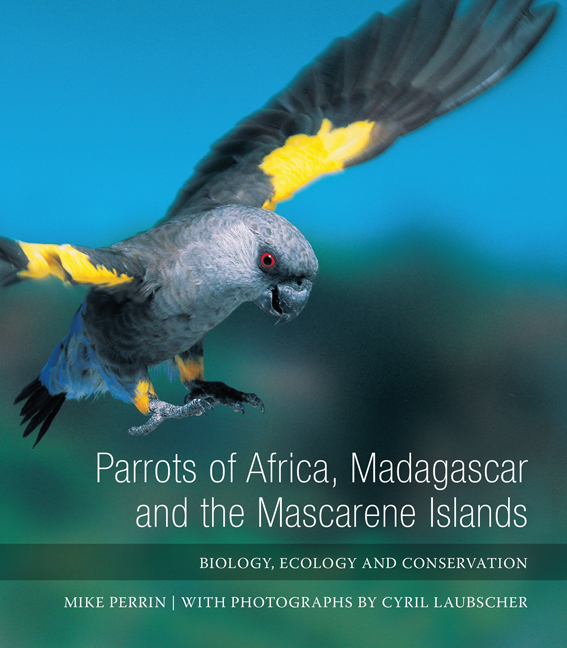Book contents
- Frontmatter
- Contents at a glance
- Contents
- Acknowledgements
- List of tables
- List of figures
- Abbreviations
- Chapter 1 Introduction
- Chapter 2 Conservation Biology
- Chapter 3 Systematics
- Chapter 4 Biogeography and Niche Separation
- Chapter 5 Intelligence, Communication and Behaviour
- Chapter 6 Breeding Biology
- Chapter 7 Diet and Metabolism
- Chapter 8 Case Study – The Cape Parrot
- Chapter 9 Trade in African parrots
- Chapter 10 African Parrot Conservation
- THE PARROT SPECIES OF AFRICA
- IUCN CATEGORIES
- Chapter 11 Long-Tailed and Fossil Parrots
- Chapter 12 True Parrots
- Chapter 13 Lovebirds
- Chapter 14 Field Techniques in Parrot Research
- Species lists
- Glossary
- Bibliography
- Index
Chapter 7 - Diet and Metabolism
Published online by Cambridge University Press: 04 June 2019
- Frontmatter
- Contents at a glance
- Contents
- Acknowledgements
- List of tables
- List of figures
- Abbreviations
- Chapter 1 Introduction
- Chapter 2 Conservation Biology
- Chapter 3 Systematics
- Chapter 4 Biogeography and Niche Separation
- Chapter 5 Intelligence, Communication and Behaviour
- Chapter 6 Breeding Biology
- Chapter 7 Diet and Metabolism
- Chapter 8 Case Study – The Cape Parrot
- Chapter 9 Trade in African parrots
- Chapter 10 African Parrot Conservation
- THE PARROT SPECIES OF AFRICA
- IUCN CATEGORIES
- Chapter 11 Long-Tailed and Fossil Parrots
- Chapter 12 True Parrots
- Chapter 13 Lovebirds
- Chapter 14 Field Techniques in Parrot Research
- Species lists
- Glossary
- Bibliography
- Index
Summary
FOOD AND FEE DING
PLANT FOODS EATEN BY AFRICAN PARROTS
Most of the African parrots are predominantly frugivorous (fruit eater) species although they also eat seeds, particularly smaller arid-zone Poicephalus species. Flowers, nectar and insects are eaten occasionally. By contrast, the lovebirds are granivores (seed eaters), with most species feeding on grass or herb species, usually from the ground. Graminivorous species feed predominantly on grass seeds. There are two obvious exceptions, the forestdwelling Black-collared Lovebird, which feeds mostly on figs, and the Black-winged Lovebird, which feeds on African Juniper Juniperus procera berries and figs.
Parrots chiefly eat seeds, fruits and flower products, although several consume mainly nectar and have tongues adapted for this purpose. Many other species target flowers, a niche filled by sugarbirds and sunbirds in Africa, which has no nectarivorous parrots. Some parrots are specialist feeders; for example, the Cape Parrot feeds almost entirely on the fruits of yellowwood trees (Podocarpus spp.), although most are generalists, for example, Ruppell's Parrot and the Brown-headed Parrot. The lovebirds are predominantly granivorous and graminivorous.
The Rose-ringed Parakeet is a typical generalist, with a medium-sized all-purpose bill, typical fleshy parrot tongue and the parrot's ability to manipulate food with its feet. It has wide dietary flexibility over a very large and ecologically diverse range. The adaptability in feeding habits of captive birds (denied their natural diet) demonstrates a level of behavioural, anatomical and biochemical flexibility of great advantage to species inhabiting varied and unpredictable habitats where a wide range of feeding opportunities is presented and exploited.
In species exploiting flowers seasonally, such as Brownheaded Parrots, pollen may form a component of the diet, since it is high in protein. However, experimental investigations by Brice et al. (1989) into pollen digestion indicate that even lorikeets find it difficult to digest pollen grains and that it is unlikely to be an important source of energy or protein. These findings strongly suggest that the importance of pollen in the diet is overestimated in birds apparently adapted to exploit it.
Access to the high nutritional content of hard seeds and nuts is the prime explanation for the evolution of the powerful counter-curved bills of all parrots (Figure 7.1) (Collar 1997a).
- Type
- Chapter
- Information
- Parrots of Africa, Madagascar and the Mascarene IslandsBiology, Ecology and Conservation, pp. 159 - 192Publisher: Wits University PressPrint publication year: 2012



